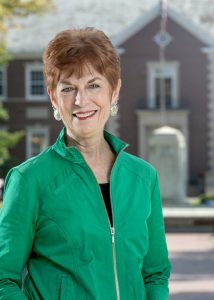
One of Chautauqua Institution’s most amazing gifts comes in the form of a willowy, gracious redhead who can be spotted each Sunday morning of the season ushering at the Ecumenical Service of Worship and Sermon in the Amphitheater.
Maureen O’Connor Rovegno, the director of Chautauqua’s Department of Religion, has been the force behind bold and beautiful initiatives near and far.
At 9:15 a.m. Thursday, August 8 at the Chautauqua Women’s Club, as part of the CWC’s Chautauqua Speaks series, Rovegno will lead a discussion, “Moments of Grace: Sharing and Reflecting On Our Stories of Grace and Gratitude.”
Originally from the greater Philadelphia area, Rovegno realized as a little girl that she was “immersed in an awareness of grace.” Raised by an Irish-Catholic father who she said prayed nightly at her bedside, and a Presbyterian mother who “was also a person of faith, and … had a wonderful spiritual outlook on life,” she took their faith to heart.
Rovegno said that at age 16, she had an “out-of-body experience” which she told nobody about “because it would not have been socially acceptable.” At the Women’s Club, she will talk openly about it.
“What that moment showed me was that I was, as I thought then, ‘Spirit trapped within body,’ and it was completely reassuring, and not scary at all,” Rovegno said. “It made me look at Creation differently, and opened me up to being able to experience the ‘More Than,’ and to recognize all the experiences of grace in my life and everywhere.”
She said that she traces her “immersion in the mystical, … the ‘More Than,’ to those early experiences.”
Choosing a Catholic college over a convent, Rovegno enrolled at Duquesne University of the Holy Spirit in Pittsburgh, where she majored in English and minored in religion.
“After 16 years of Catholic education, I decided that I had the overpowering need to know that the rest of the world understands and experiences the Divine, so I embarked on my journey into the world’s religions,” Rovegno said.
She studied intensively and eventually taught world religions for 12 years at Mercyhurst Preparatory School, a Catholic, coeducational secondary school in Erie, Pennsylvania, and a member of the International Baccalaureate program.
At Mercyhurst Prep, Rovegno sought “to prepare citizens for the world” and co-developed the IB’s in-depth, inquiry-based world religions component.
“Understanding the ‘More Than’ in other faiths gave me (a) deeper understanding and showed me the commonality of all faiths when they ‘bubble up’ to the mystical level,” she said.
Chautauqua came into Rovegno’s ambit in 1990. She said within a few years she became very involved in the Institution’s Department of Religion. In addition, she assumed significant leadership responsibilities within the Institution.
From 1996 to 2002 — through the successful Renewal Campaign — Rovegno was the chair of the annual Chautauqua Fund. She served two terms as a member of Chautauqua Institution’s Board of Trustees, from 1996 to 2004.
In 1999, Rovegno entered Harvard Divinity School, one of a small group of non-denominational divinity schools in the United States that are university-based.
Four years later, she earned her Master of Divinity. Rovegno said that at Harvard, the Master of Divinity is considered a terminal degree, as are its Juris Doctor and Medicinae Doctor degrees.
Having already learned Hebrew, Rovegno remained at Harvard Divinity School an extra year to better understand Islam by taking a second year of Arabic.
“That gave me some great stories,” she said. “So I am greatly looking forward to sharing (them) with friends at the Women’s Club (and hearing) their stories as well.”
In divinity school, Rovegno’s concentration was in comparative religious ethics, and her ministerial focus was restorative justice. Upon graduation, she trained in clinical pastoral ministry and began serving as an interdenominational and interfaith chaplain in hospice care, hospital and prison settings.
As she was immersing herself in divinity studies and chairing the Institution’s Fund, Rovegno was also serving as a member of the board of trustees search committee that — in preparation for the Rev. Dr. Ross MacKenzie’s retirement as director of religion — led to the Rev. Dr. Joan Brown Campbell’s appointment to this position in March 2000.
When Campbell said she needed Rovegno’s assistance, Rovegno voluntarily served as chair of Campbell’s Religion Advisory Committee.
Fifteen seasons ago, in 2005, she joined Campbell’s staff.
Immediately, she began designing, founding and directing the Institution’s signature Abrahamic Program for Young Adults. All along, she had been encouraging a broadening of interfaith outreach and actively working on behalf of the Abrahamic Program, launched in 1998.
In 2006, Rovegno formed APYA “to involve young adults, ages 16 to 22, in conversations and experiences that foster understanding and connection among all people — practitioners of the Abrahamic religions as well as non-practicing seekers of knowledge.”
Globally, Rovegno has applied her knowledge and talents to furthering the Global Peace Initiative for Women and the Charter for Compassion.
She said that she has worked with the GPIW — formed in 2002 after the first World Summit of Women Religious and Spiritual Leaders, which was held in Geneva, Switzerland — “to empower women worldwide to raise their voices for peace and to help other women to do the same.”
After the author of 26 scholarly books about faith and the major religions, Karen Armstrong, won the 2008 TED Prize of $1 million for her provocative, original thinking on the role of religion in the modern world — especially her appeal to the TED community to help make religion a force for harmony by building a Charter of Compassion to restore the Golden Rule as the central global religious doctrine — Rovegno rolled up her sleeves.
Working closely with Armstrong, who by then had made 39 appearances at the Institution, she took part in drafting and finalizing the Charter of Compassion on the grounds, within the Department of Religion. In November 2009, it was completed and signed.
This June, she joined in celebrating the Charter for Compassion’s 10th anniversary at the Athenaeum Hotel.
Locally, Rovegno has served for many years on the board of the Chautauqua Area Habitat for Humanity, headquartered in Fredonia, and as a trustee of Hurlbut Memorial Community United Methodist Church, situated within the Institution.
“By Thursday, we will have been blessed by three days of (interfaith) lectures on grace, so I will not be doing a lecture (at the Women’s Club),” Rovegno said. “I will share a few personal stories … of how I experience grace in my life, and I will invite those there with me to come prepared to share their stories of grace in their lives. … We rarely let ourselves have these conversations in a group — or even one to one.”

